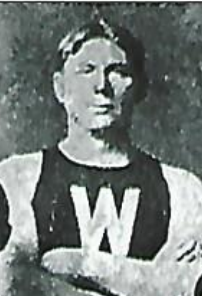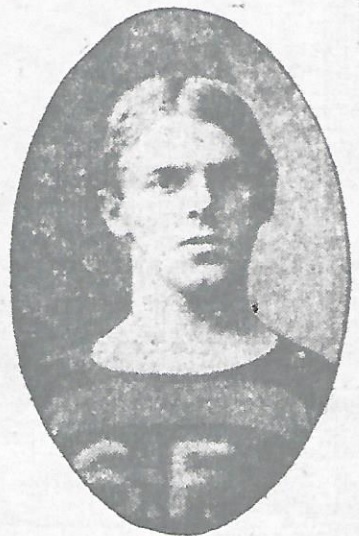 This game is from 1900-01 and was played in Hudson, Massachusetts. It was the third season of professional basketball and just 10 years after James Naismith created the game of basketball. Hudson is about an hours drive from the birthplace of basketball, Springfield, MA, but in 1900 it was about a days ride away. Webster is about an hour away as well. The Webster team was able to get the Hudson via train and it still took them several hours.
This game is from 1900-01 and was played in Hudson, Massachusetts. It was the third season of professional basketball and just 10 years after James Naismith created the game of basketball. Hudson is about an hours drive from the birthplace of basketball, Springfield, MA, but in 1900 it was about a days ride away. Webster is about an hour away as well. The Webster team was able to get the Hudson via train and it still took them several hours.
The game was played as part of the MCBL (Massachusetts Central Basketball League), sometimes called the MSBL(Massachusetts State Basketball League). The league merged from the earlier MBL (Massachusetts Basketball League) which formed in 1899. Webster played their home games at Music Hall in Webster, Massachusetts which had a seating capacity of 800.
In 1900 there were 7 teams in the MCBL. Webster (28-13), South Worcester CYML (21-19), Lowell Burkes (22-21), Lowell PAC (16-16), Hudson (17-23), Marlboro (14-19), Worcester Father Mathews (17-24). Marlboro's franchise was tranfered to Millbury on New Years Day, and Lowell PAC was suspended for about a month in February 1901.
The MCBL lasted until January 1902 until it suspended operations. The MCBL had five teams in it's last season. Webster, Millbury, Worcester Father Mathews, South Worcester CYML, and Woonsocket. When the league ended in January 1902 Webster had the best record at 15-5. Millbury followed close behind at 12-6. Worcester had a 12-7 record, South Worcester was 2-12 and Woonsocket was dead last at 0-11.

Anthony Conlon
Webster was coached by Anthony Conlon. Conlon coached in the MCBL and MBL during its entire existance from 1899 until 1902. He first coached Fitchburg and when they disbanded he went to Webster and coached Webster a year after the MCBL folded until 1903. In 1904 he coached Westfield. He is sometimes credited with coaching Mystic in the CSBL in 1953-54, but that cannot be correct as Anthony Conlon died in 1933.
Conlon also played for the Webster team as well as coached them. Conlon was one of the most successful players of the early basketball in Massachusetts. He lead Fitchburg to a champion and Webster to two championships and won another championship in the Connecticut State Basketball League.
Hudson played at the Opera House in Hudson, MA, and had a seating capacity of 750. The Hudson team was coached by Jack Porter who coached them for all 40 of their only games in the MCBL and than he coached Natick in the NEBL for 9 games.

Jack Porter
Like Anthony Conlon, Jack Porter also coached and played for his team. Though, unlike Conlon, Porter did not play as much. Porter only is credited with playing one game for Hudson in the MCBL. He did however, play for a Hudson team in the New England Basketball League and lead them to a championship. It is unknown if this Hudson team is that same Hudson team Porter lead to a championship.
Porter was one of the best players of the early era and was considered one of the best defenders of the era as well.
Teams and leagues in the early days of basketball were often fly by night kind of endevors. Many teams would play in several leagues at the same time, and many players also played for several teams at the same time. This was because basketball was not a profitable endevor. Many teams were owned by business who used the team to market their business and players where often made up of workers for the company. The players would work their 9-5 job at the company and than play basketball at night. However, it does not appear that the MCBL was one of these company leagues, and may have had a structure closer to the modern NBA than any of their contemporaries.
The 40-plus games is also a rarity for these early leagues. Many teams at the time had fewer than 10 games in any specific league.
The game is billed as the "fastest game of the season", however records indicate that Hudson averaged 19 points per game that season.
Low scoring games were also normal for early basketball leagues. The game was slow and defense resembled something you'd see in rugby. Tackeling was a thing in early basketball league.
Both teams are extremely smmall markets. Hudson, at the time had a population of just over 5,000 people and Webster had around 9,000 according to the United States Census Bureau
Neither team had a nickname. However, nicknames were not required at the time and did not become common place until World War I. However, teams would often be called the fives; IE Hudson Five vs Webster Five. Webster eventuallly did adopt a nickname and would be called the Webster Wizzards. Another common nickname for early basketball teams, and even players, was cagers. Cagers would not apply here since the earliest cages come right before World War I. Because early basketball was so violent, a cage or net was often put up around the court and the players became known as cagers.
The article references positions. Only one of the positions, Center, is still used today. The other positions were Right Forward, Left Forward, Left Back and Right Back. The forward positions are pretty self explanitory in that they evolved into the small forward and power forward positions of today. The Backs are the guard positions today. At the time there was no true point guard or ball guard, because several league did not allow dribbling of the basketball.
There were designated free-throw shooters. This player would shoot free-throws regardless of who was fouled. This designation continued in basketball until the mid 1930s, and has even been brought back in a couple of newer leagues that failed.
Webster Left Forward Stanis Mathieu was the Webster designated free-throw shooter, but apparently was not very good at it because he shot 1/7.
There were more time keepers than referees.
The game was made up of two 20-minute halves: something still common in todays game. However, at the time teams could choose to play two 20-minute halves or three 15-minute periods. This game appears to have chosen the 20-minute halves. Teams would decide before the game what they wanted to do.
The attendence for this game was 350 people, which seems like not a lot of people but in a town of around 5,000 people, that is about 6% of the population. The game was played at the opera house in Hudson and attendence was about half the capacity of the opera house.

This is the Hudson Opera House in July 1916
Stanis Mathieu lived until 1954 and lived most his life in the central Massachusetts area. He would have been alive when the Boston Celtics formed, though he never got to see them win an NBA title dying two years before they captured their first title. Mathieu also played for several other teams and leagues around Massachusetts until at least 1909.
Mathieu was also a duel sports player, he also played minor league baseball making it all the way to the Providence Grays of the Eastern Baseball League. There is however, no record of him ever being called up to the majors.
Unfortinately, records of early basketball games, leagues, teams and players are hard to come by. Often all historians have are newspaper clips such as this one above that often do not have very much detail.

Henry Martens
Henry Martens lead the Hudson team in the game in 1900. Sometimes his name is spelled Henry Marden or Mardens. Another issue with early basketball is that players names are often misspelled or aliases are used.
Martens was from Springfield, MA, the birthplace of basketball, and he and his brother Charles often played at the YMCA where James Naismith invented basketball. Martens played in manny of the Massachusetts based basketball leagues from 1899 until 1906. He did play in one of the first major professional basketball leagues, the ABL, for a short time in 1903.
Charles Martens had a similarly successful career to his brother, but he was often consider the more talented brother, his career was longer lasting until at least 1909. Charles Martens is one of the few players of this era who averaged double figures scoring. He averaged almost 16 points a game for Meridian of the ABL in 1904.
Sources:
Pro Basketball Encyclopedia
Reddit
Baseball Reference
Digital Commonweath - Mass. Collections Online
| 
